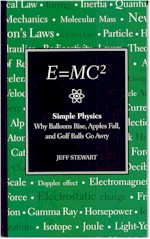 |
|
|
| ||||||
|
|
This page is the original source of this review, though you may also find it on Amazon or other sites. | ||
| Book Reviews Home | Free Audio Books | |
 |
Book Review of: E=MC2Simple Physics. Why Balloons Rise, Apples Fall, and Golf Balls Go Awry Price:
$10.17 Availability: Usually ships
within 24 hours |
| Review
of
E=MC2, by Jeff Stewart (Hardcover, 2010) (You can print this review in landscape mode, if you want a hardcopy) Reviewer: Mark Lamendola, author of over 6,000 articles. Entertaining, humorous, brilliant, and educational. Well done, Mr. Stewart! I've long been a physics buff, but I think even someone not so inclined would enjoy reading this book just because it's humorous. For those of us who are partial to this topic, it makes for a light-hearted review that sure beats dragging out a few dozen big books to jog those memory cells. Physics can be daunting (I found mechanical physics very challenging, when I first encountered it in college), especially if you get bogged down in the math and are not the kind of person who does math problems for entertainment. This book uses simple math, so you aren't going to be confronting difficult equations or lines of Greek letters. The author skips those equations, but does use examples from the classic physics literature (physics buffs will recognize them). He also uses some that are simpler variations or just new. This book contains no factual errors, or at least I did not notice any. The grammar and writing are also flawless. And the author sticks to the topic of the book, which is commendable in today's nonfiction world. Something I run into frequently is the person who does not understand basic physics. For some reason, this always astounds me. It seems inexplicable. But with this book now available, nobody has any excuse! When you understand the basic concepts of physics, you have huge cognitive and perceptual advantages over the person who does not. If you have this understanding, I don't need to explain this. If you don't have this understanding, an explanation of the advantages it brings is not the solution you need. The understanding itself is. You can get that understanding with this book, and have a lot of fun doing so.
This book consists of 10 chapters in 170 pages in a small format book (about the height and width of a typical paperback novel). It has an index and a metric conversion table. The author starts off by giving us a brief history of physics, in Chapter 1. And it really is brief. You get the major points, and they are good to know. For people who want more, there are books and movies on individual physicists, on all areas of physics history. Chapters 2, 3, 4, 5, 6, and 7 respectively cover forces, energy and power, momentum, heat and matter, waves, and electricity. Chapter 8 discusses Relativity, which is almost synonymous with Einstein. Naturally, that discussion is followed by one on Quantum Physics in Chapter 9. The final chapter looks at some of the questions physicists and astronomers are trying to answer about the universe. This is a great book to add to any nonfiction collection. It would be great for schools to use this in the classroom, but my experience also indicates that many adults would benefit from reading it. | |
About these reviewsYou may be wondering why the reviews here are any different from the hundreds of "reviews" posted online. Notice the quotation marks? I've been reviewing books for sites like Amazon for many years now, and it dismays me that Amazon found it necessary to post a minimum word count for reviews. It further dismays me that it's only 20 words. If that's all you have to say about a book, why bother? And why waste everyone else's time with such drivel? As a reader of such reviews, I feel like I am being told that I do not matter. The flippancy of people who write these terse "reviews" is insulting to the authors also, I would suspect. This sound bite blathering taking the place of any actual communication is increasingly a problem in our mindless, blog-posting Webosphere. Sadly, Google rewards such pointlessness as "content" so we just get more if this inanity. My reviews, contrary to current (non) standards, actually tell you about the book. I always got an "A" on a book review I did as a kid (that's how I remember it anyhow, and it's my story so I'm sticking to it). A book review contains certain elements and has a logical structure. It informs the reader about the book. A book review may also tell the reader whether the reviewer liked it, but revealing a reviewer's personal taste is not necessary for an informative book review. About your reviewer
About reading styleNo, I do not "speed read" through these. That said, I do read at a fast rate. But, in contrast to speed reading, I read everything when I read a book for review. Speed reading is a specialized type of reading that requires skipping text as you go. Using this technique, I've been able to consistently "max out" a speed reading machine at 2080 words per minute with 80% comprehension. This method is great if you are out to show how fast you can read. But I didn't use it in graduate school and I don't use it now. I think it takes the joy out of reading, and that pleasure is a big part of why I read. |
| |||||